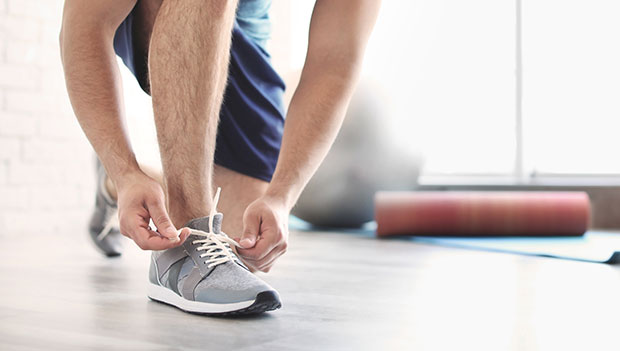
From driving into the floor during squats, to gaining full flexion during cardio workouts, your feet work hard while you exercise. It's important to care for and protect them by finding the best training shoes you can. To fitness newbies, it might seem silly to buy a special pair of shoes just for working out, but you'll feel the difference immediately. Having the right accessories and gear can make a world of a difference.
Not all training shoes are suitable for every type of workout, though, as one might be better for running while another might offer better support as you power through that third set of burpees.
Luckily, finding the best workout shoes is simple because the ACTIVE Reviews Team has researched countless pairs and done the hard work for you. Read on to find our top picks for the best training shoes, then choose the ones best suited for your needs.
Why Trust Us?
The ACTIVE Reviews Team is made up of fitness experts that include athletes, coaches, and certified trainers who bring their years of knowledge and experience to each review. More importantly, each member of our team is a fitness enthusiast. Fitness may be our job, but it is also our passion. Therefore, we strive to bring you products that we trust and would personally use.
Best Training Shoes - Our Top Picks
By clicking on the product links in this article, we may receive a commission fee at no cost to you, the reader. Sponsorships and affiliate commissions help support our research so we can help you find the best products. Read full affiliate disclosure here.
- Best Overall Training Shoes: Nike ZoomX Invincible Run Flyknit 2
- Best Reebok Training Shoes: Reebok Nano X1 Training Shoes
- Best Training Shoes for Men: adidas Trainer V Shoes
- Best Training Shoes for Women: HOKA ONE ONE Bondi 7
- Best Training Shoes for Weightlifting: GORUCK Ballistic Trainers
- Best Budget Training Shoes: Under Armour Charged Commit 3 Training Shoes
- Best Cross-Training Shoes: NOBULL Trainer
- Best HIIT Training Shoes: Under Armour Project Rock
- Best Training Shoes for Walking and Running: Salomon INDEX .01 Shoes
Best Overall Training Shoes - Nike ZoomX Invincible Run Flyknit
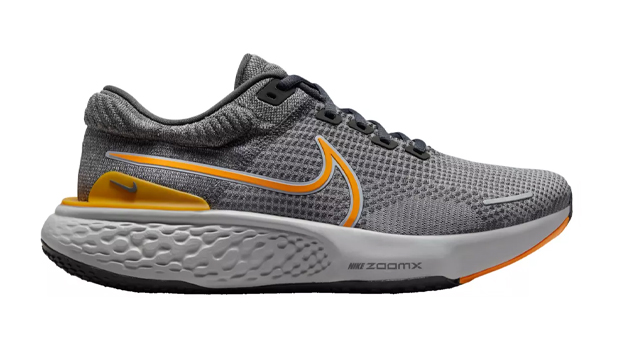
SPECS
- Key features: Responsive foam cushioning
- Drop: N/A
- Sizes: Men's 3.5 - 15; Women's 5 - 12
Whether you're in the middle of a big race or you're doing wind sprints as part of your training, avoiding injury is every athlete's top priority. The Nike ZoomX Invincible Run Flyknit shoes were made with injury prevention in mind. Scientifically designed to offset the attrition of intense training sessions, these shoes come outfitted with robust, lightweight cushioning, protecting your feet while offering a springy sense of propulsion.
Not only are they buoyant and responsive, but these shoes are also made to offer the secure, comfortable fit you need, allowing you to truly focus on your workout. A wider shape offers improved stability, while a range of colors ensures you can train in style.
What We Like
- Responsive, lightweight cushioning
- Secure fit
- Designed with longevity in mind
- Lots of vibrant colors
- Wide shape for added stability
What We Don't Like
- Women's size options are slightly more limited
- Laces aren't quite as durable as we'd like
BUY: Nike ZoomX Invincible Run Flyknit
Best Reebok Training Shoes – Reebok Nano Training Shoes
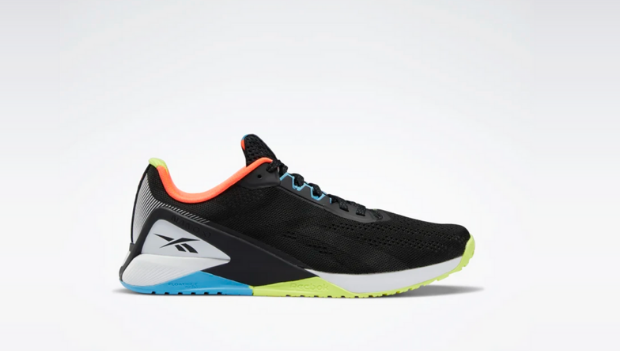
SPECS
- Key feature: Wide toe box
- Drop: 7 mm
- Sizes: Men's 7-14; women's 5-11
Combining comfort and stability, the Reebok Nano X1 training shoes, for men and women, help keep you on your feet (literally) no matter how grueling your daily workout is. They have a wide toe box, which is ideal for people with wide feet who typically have a harder time finding a good training shoe.
The Reebok Nano X1 has better midfoot cushioning than most other pairs of workout shoes, so they'll keep you comfortable whether you're doing plyometric movements or lifting weights. The rubber outsole is grippy, offering plenty of traction every time your foot hits the ground. We also like the thermoplastic polyurethane (TPU) casing, which helps provide some additional heel support. Bottom line? Whether you're into running, CrossFit, or weightlifting, this is a training shoe that should serve you well.
What We Like
- Very comfortable
- Stable
- Wide toe box
- Excellent grip and traction
What We Don't Like
- Slightly more limited size range
- Limited color options
Best Training Shoes for Men – adidas Trainer V Shoes
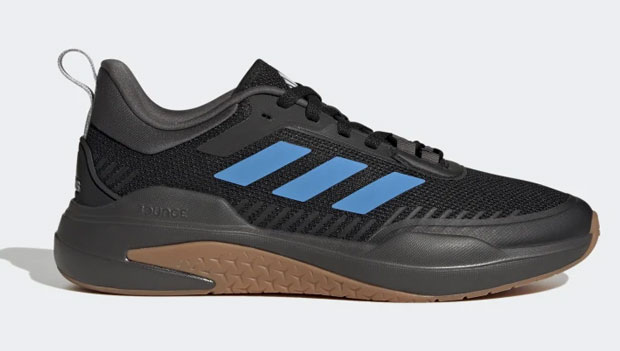
SPECS
- Key feature: Lighweight cushioning underfoot
- Drop: N/A
- Sizes: Men’s 6.5-14
Men can train in retro style and comfort with the adidas Trainer V shoes. These shoes offer flexibility for performing aerobic training and stability for heavy lifting PRs in the gym. They're also super affordable, which make them even more appealing to the gym-goer on a budget.
What We Like
- Excellent price point
- Flexible upper
- Made from 50% recycled materials
- Snug fit
What We Don't Like
- Limited color options
- Some reviewers dislike the texture
Best Training Shoes for Women – HOKA ONE ONE Bondi 7
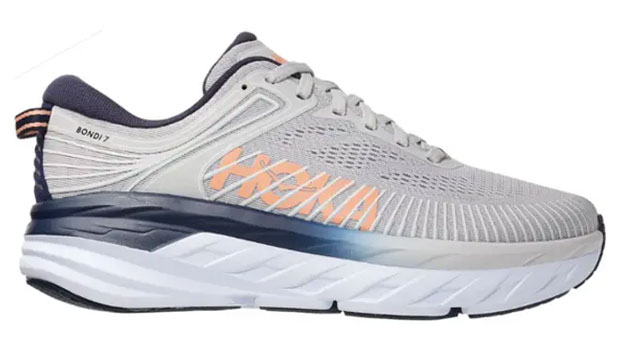
SPECS
- Key feature: Increased forefoot bending
- Drop: 4 mm
- Sizes: Women's 5-12
Women need maximum cushioning to support their feet, particularly during intense workouts. The HOKA ONE ONE Bondi 7 provides that higher level of cushioning via a massive bed of EVA foam. This foam level offers a plush underfoot feel, making this one of the most comfortable and supportive running shoes around.
The shoe also offers a lightweight, mesh top, which is both breathable and lightweight. And, the natural feel of the shoe lends itself to quick transitions from landing to takeoff. All in all, the HOKA ONE ONE Bondi 7 is a great smooth shoe that will make any workout more pleasant.
What We Like
- Lots of cushioning
- Breathable mesh top
- Natural, lightweight feel
- Especially good for running
- Multiple color options
What We Don't Like
- Other shoes are better for traction and grip
- Not the most affordable shoes on our list
Best Training Shoes for Weightlifting– GORUCK Ballistic Trainers
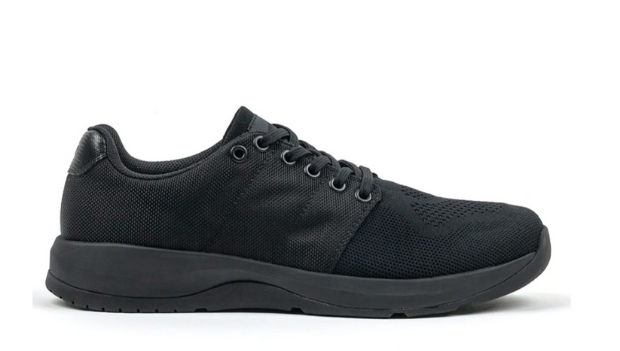
SPECS
- Key feature: Grippy, durable rubber outsole
- Drop: 8 mm
- Sizes: Men’s 4-15; women’s 6-17 (sold as unisex)
When you're lifting weights, you want your feet to be stable at all times. Without a doubt, the GORUCK Ballistic Trainers are the best training shoes for stability because they offer support for all parts of your feet. The Ballistic nylon upper gives shock absorption, the TPU heel counter keeps you in place during dynamic movements, an extra top lace eyelet offers additional heel and ankle support and the wide toe box allows room for your foot to swell without becoming uncomfortable.
The GORUCK Ballistic Trainers were designed by U.S. veterans, so you can be sure the design is solid and stable. You'll feel secure whether you're lifting a loaded barbell or carrying a weighted backpack hundreds of miles. If you're looking for the best gym shoes for heavy-duty activities, these may be for you.
What We Like
- Excellent grip
- Heavy-duty materials
- Made by veterans
- Offer ample stability
- Reasonable price point
What We Don't Like
- Limited color options
- Not everyone will like the basic, no-fuss design
BUY: GORUCK Ballistic Trainers
Best Budget Training Shoes – Under Armour Charged Commit 3 Training Shoes
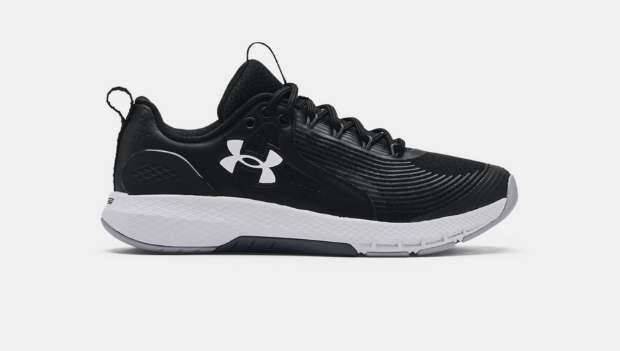
SPECS
- Key feature: Midsole cushioning for impact absorption
- Drop: 8 mm
- Sizes: Men’s 7-15
You don’t have to break the bank to get a high-quality, high-performance workout shoe. Case in point? Under Armour Charged Commit 3 Training Shoes. You can get a pair for well under $100, but make no mistake: From the design to the materials, these gym shoes are serious business, and should hold up well over the course of many workouts.
Leather at the top of the shoe provides stability, while the bottom of the shoe offers flex grooves for comfortable movement and traction. A heel counter hugs the foot for additional stability, and midsole cushioning absorbs impact as you run, jump, or simply move around the gym.
PROS
- Shock and impact absorption
- Lots of stability
- Breathable and lightweight
- Great price point
CONS
- Long-distance runners may want something a little more durable
- Just 3 color options
BUY: Under Armour Charged Commit 3 Training Shoes
Best Cross-Training Shoes – NOBULL Trainer
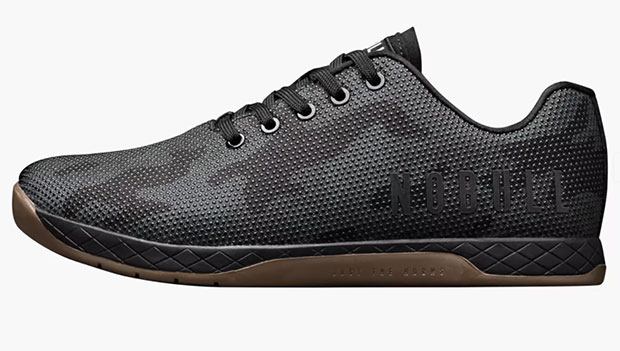
SPECS
- Key feature: Midsole cushioning for impact absorption
- Drop: 8 mm
- Sizes: Men's 7-15, women's 5-11
A good cross-trainer shoe can elevate your workout regimen, and the NOBULL Trainer is a great option. It has a flat sole that gives you stability during deadlifts, though it's still flexible enough to get you through more dynamic movements. We did find it lacked some shock absorption and arch support, so it might not be the best pick for things like box jumps.
The NOBULL Trainer is somewhat minimalistic in design, so if you're after aesthetics, this might not be the shoe for you. However, when it comes to functionality, there are few better out there. They do take a while to break in, but trust that your patience will be rewarded.
What We Like
- Flat sole for stability
- Durable upper construction resists abrasion from movements like rope climbs
- Several color options
- Reflective logo provides visibility during late-night, outdoor workouts
What We Don't Like
- Not the most budget-friendly
- If you solely want running shoes, these are not for you
Best HIIT Training Shoes – Under Armour Project Rock
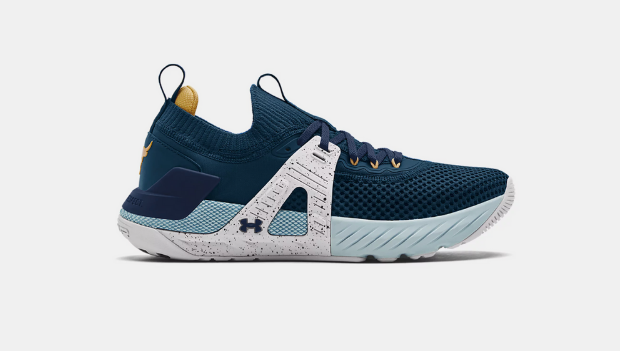
SPECS
- Key feature: Rubber outsole for increased traction
- Drop: 8 mm
- Sizes: Men's 7-15; women’' 5-12
High-intensity interval training, better known as HIIT, involves a lot of multidirectional movement. The Under Armour Project Rock collection, designed by Dwayne "The Rock" Johnson, helps you do that with a shoe that's durable and comfortable. It has a breathable upper, and the HOVR midsole creates shock absorption while still allowing you to perform quick movements.
The Under Armour Project Rock has an extended heel counter, which adds to its stability and makes it easier for you to perform dynamic movements. A full-length rubber outsole gives you more peace of mind by eliminating slips. We do recommend going up at least half a size, though, as these shoes can run small.
What We Like
- Excellent traction, minimizing slipping
- High-quality, durable materials
- Shock absorbent
- Breathable materials
What We Don't Like
- Sizing is a little off, and may require some trial and error
- Limited color selection
BUY: Under Armour Project Rock
Best Training Shoes for Walking and Running – Salomon INDEX.01 Shoes
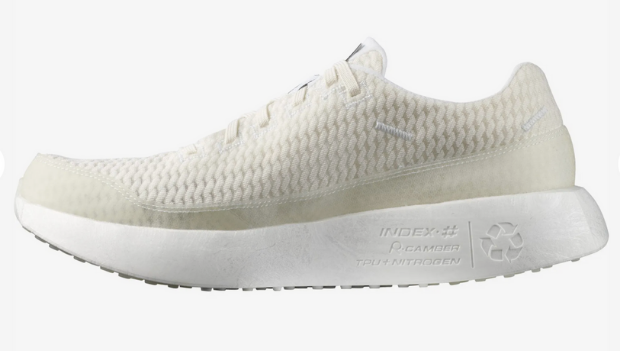
SPECS
- Key feature: Traction for all terrains
- Drop: 9 mm
- Sizes: Men's 4-13 (sold as unisex)
Looking for a shoe that will be comfortable and supportive on any kind of terrain, whether you're mall-walking or road-running? Take a look at the Salomon INDEX.01 Shoes. While they aren't the cheapest shoes on the market they're nevertheless a great, all-purpose, unisex option. They're designed to keep your body supported and your feet comfy during even the longest of runs.
The shoes are made with recycled materials, making them an outstanding option for eco-conscious buyers. There’s ample cushioning to keep landings comfortable, minimizing shock and impact. And, the bottom of the shoe is made to supply traction across any type of terrain.
What We Like
- Recycled materials
- Flat laces reduce pressure points
- Long-lasting foam cushioning
What We Don't Like
- More expensive than other shoes on the list
- Sizing for unisex shoes can be tricky
What Are Training Shoes?
It's important to note that training shoes are designed a little bit differently from running shoes. While the average running shoe is designed to perform well on pavement as well as indoor tracks and courts, training shoes are usually made specifically with the gym in mind.
As such, they can work well for a wide range of workout routines, including:
- Aerobic and cardio workouts
- Weightlifting
- HIIT
- CrossFit
- Jumping
- Lunging
- Speed training
- Strength training
Training Shoes vs. Running Shoes
The best running shoes are not necessarily the best training shoes. Here are some important differences between the two:
- Training shoes are made to support multi-dimensional movements
- Compared with running shoes, training shoes furnish greater stability for lifting weights
- Training shoes also offer protection for rope climbing
- A wider platform helps training shoes keep you more sure-footed
- A thinner sole promotes better control for foot movement
- Training shoes have a lower heel drop to keep feet closer to the ground
What to Look for in a Training Shoe
Looking for a training shoe can be overwhelming, especially if you’re browsing through the countless selections offered on Amazon or Zappos. While you might be familiar with household names like New Balance, Puma, or ASICS, a lot has changed in the training shoe world in recent years. Here are just a few of the things you should be aware of when looking for a training shoe that’s right for you.
Price
Training shoes are an investment and should be treated as such. This is a case where if you try to find a bargain, you'll end up spending more money trying to bring your feet back to good health. So yes, some of these might come with a bit of sticker shock, but think about your purchase as an investment that protects and supports your feet.
For many of these options you'll be wearing them during training only. You're not going to wear these to dinner with friends or while running errands around town (you could, but they might not last as long). A weightlifting shoe will be worn while weightlifting, a running shoe while running, and a CrossFit shoe...well, you get the point. That means they're going to last you longer, or at least they should, so you won't have to buy another pair quite as often as you do for your everyday kicks.
Width of the Shoe
Think like Goldilocks when it comes to the width of your shoe—you don’t want it to be too tight or too loose but just right. That way, you can feel secure in them without restricting the blood flow to your feet.
Your feet tend to swell as you put them through heavy activity, so make sure they're a little looser when you first put them on so they have room to expand.
Cushioning
Depending on the type of activity you're doing, you may want more or less cushioning on your shoe. Cushioning, in this context, doesn't just refer to how soft a shoe feels on your feet but how well it absorbs impact. For runners, that's when your feet hit the ground, and you'll want that cushion so your feet don’t get banged up. Weightlifters, on the other hand, don’t need as much cushion because it makes your feet less stable when you're driving them into the floor during a heavy squat or deadlift.
Durability
For one, you want a durable shoe because you want it to last a while. But durability is also vital in a training shoe because you don't want it coming apart while you're running or lifting. Be wary of training shoes with a lot of stitching, as that increases the tendency of wear and tear and makes it more likely that one part will rip off or start to come undone throughout its lifetime.
Aesthetics
Some people might not care if their training shoes match their leggings or training outfits, but there are those who do. If you fall into the latter category, be aware some brands put more attention on the construction of the shoe and not the design. On the flipside, there are those who spend more time trying to make a stylish shoe that ends up not being very functional.
We like to advise falling somewhere in the middle. A training shoe can be a conversation starter, especially if it has a unique design to it, but at the end of the day, you're buying a shoe to help you train more efficiently. Don't spend too much time focusing on how they look, but also don't opt for a pair that can bring down your street cred.
FAQs About Training Shoes
Still have questions about finding the right training shoe? Here are a few of the most common inquiries.
Are training shoes good for everyday use?
Training shoes are made to be versatile, comfortable, and supportive, which means that they generally work well for casual wear. Some training shoes are better-suited than others for everyday use. For casual wear, seek training shoes that have a cushioned sole and high-impact protection.
Is it okay to wear training shoes for walking?
Training shoes are generally not recommended for walking long distances. For wearing casually, such as when running a few errands, they will work just fine. For long, multi-mile walks through your neighborhood or through a local park, training shoes may not be the best option.
Are flat shoes better for lifting?
Flat-soled shoes are often recommended for weight training, particularly over running shoes. A strong, stiff, flat sole helps transfer force from the sole of the shoe to the ground, keeping you stable throughout your workout.
About the Author

Sosha is a staff writer for ACTIVE.com and a CrossFit enthusiast. Her work’s been featured in The Washington Post, Huffington Post, MUTHA Magazine, Charlotte Magazine, and The Charlotte Observer. Her weekly column, Soshally Awkward, is featured on the nationally-syndicated radio show, Bob & Sheri.
Get ACTIVE on the Go


Couch to 5K®
The best way to get new runners off the couch and across the finish line of their first 5K.
Available for iOS | Android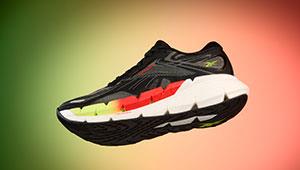
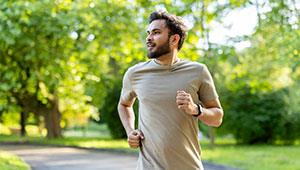
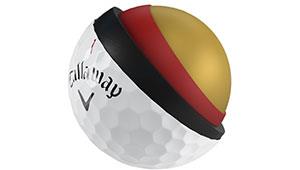
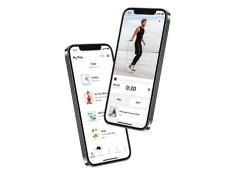
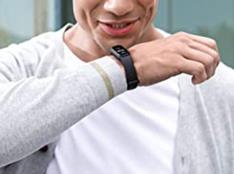
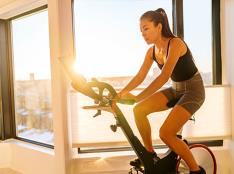
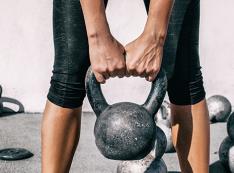
Discuss This Article